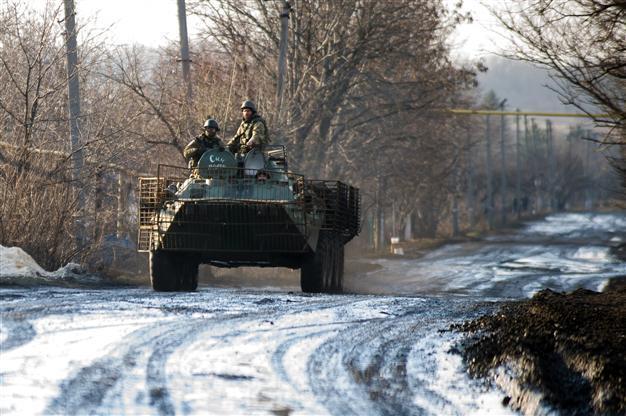Kerry due in Ukraine as talk of arming Kyiv grows
KYIV - Agence France-Presse

Ukrainian servicemen ride an Armoured Personnel Vehicle (APC) in the village of Horlivka, Donetsk region, on February 4, 2015. AFP Photo
US Secretary of State John Kerry was due in Kyiv Feb. 5 for talks focussing on the possibility of arming Ukrainian forces, a day after four civilians were killed when a hospital in east Ukraine was shelled.
His visit comes as international pressure grows for an immediate halt to surging violence that has seen hundreds of civilians killed in recent weeks as pro-Russian rebels push into government-held territory.
Speaking before Kerry's trip, President Petro Poroshenko said the events of recent days should encourage NATO to "provide more support to Ukraine, including the provision of modern weapons to protect itself and defend itself against the aggressor".
"We need a strong army with new weapons, this will help us to defend the civilian population against attacks by terrorists," he told German newspaper Die Welt.
US President Barack Obama's nominee for defense secretary said he was likely to support providing weapons -- something that the administration has so far ruled out.
Ashton Carter, expected to be confirmed soon as Pentagon chief, told a US Senate committee that "we need to support the Ukrainians in defending themselves".
However, Vice President Joe Biden seemed less hawkish, telling German newspaper Sueddeutsche Zeitung: "We have said since the beginning that there is no military solution to this crisis."
"We have no interest in a military escalation and insist on the opposite," he said, while adding that Washington could provide "help in the security field".
Carter's comments will be welcomed by Kyiv's pro-Western leaders, hopeful that their long-standing demands for the US to supply weapons could be met.
Washington has so far provided only non-lethal assistance to Ukraine, including flak jackets, medical supplies, radios and night-vision goggles, fearful of becoming embroiled in a proxy war with Russia.
But the failure of economic sanctions to force Russia to halt what the West sees as Moscow's military support for the separatists has prompted a second look at the option.
Ukraine is believed to be seeking weapons including so-called "fire-and-forget" advanced anti-tank missiles to counter the heavy armour it says Moscow has poured over the border.
"What we need is exactly modern warfare, which we've been lacking all this time," Ukraine's Foreign Minister Pavlo Klimkin told Western journalists in Kyiv.
While Kerry is not expected to pledge any arms during his trip, Klimkin said he nevertheless hoped for "deliverables" from the visit and from another meeting between Poroshenko and Biden in Munich.
Poroshenko said on Tuesday he had "no doubt" that the US and other NATO allies would eventually agree to start arming Ukraine.
Ukraine and its Western allies accuse Moscow of sending thousands of regular army troops and weapons to support the rebels.
And while Moscow has repeatedly denied the allegations, the rebels appear to be equipped with the advanced weaponry of a regular army.
The fighting has claimed more than 5,358 lives since last April, including some 220 in just the past three weeks, according to the United Nations.
Fears are now mounting of a sharp escalation in the violence in the east after truce talks collapsed and rebels announced an ambitious mobilisation aimed at bolstering their forces to 100,000 fighters.
The latest violence saw four people killed Wednesday when a hospital was shelled in the rebel stronghold of Donetsk.
Eight other civilians were killed in clashes around the region in a 24-hour period, rebel and government officials said, and the army said four soldiers died and 25 were wounded.
EU foreign affairs head Federica Mogherini called for an immediate ceasefire to allow civilians to escape the fighting.
"The spiral of ever-increasing violence in eastern Ukraine needs to stop," Mogherini said.
Observers from the Organization for Security and Co-operation in Europe have demanded a "local temporary truce" around the battleground town of Debaltseve for the next three days.
Amnesty International said Debaltseve's population had dropped from 25,000 to 7,000 in just a few days.
The strategic railway hub between Donetsk and another rebel centre, Lugansk, has been the focus of the fiercest fighting for a week as rebels battle to encircle Ukrainian forces.
Officials say thousands of civilians have fled the beleaguered town over recent days and those remaining behind were trapped in basements without water or electricity.
"The bombardment is incessant. We are trying to bring in medication and evacuate civilians under enemy fire," Illya Kiva, an official from Ukraine's interior ministry, told AFP from Debaltseve.
Ukraine's military said rebels had launched a fierce infantry attack on the town overnight Tuesday but been beaten back after a five-hour battle.
